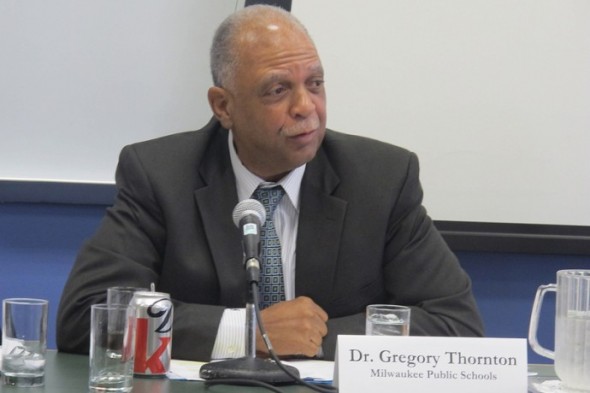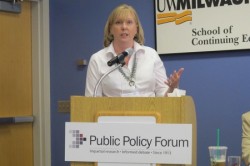Uncertain Outlook for Milwaukee Public Schools?
Poverty, crime and retiree benefits all are issues for MPS, Thornton tells conference on schools.

Dr. Gregory Thornton, superintendent of MPS, says he worries about students who don’t have the tools to succeed. (Photo by Edgar Mendez)
There’s no silver bullet when it comes to solving the woes of the Milwaukee Public School (MPS) system. That was the conclusion Public Policy Forum (PPF) researchers and education leaders arrived at during a recent panel discussion focusing on education reform in Milwaukee.
“Even if there were (a silver bullet), we wouldn’t be able to know it with all the overlapping reforms, governmental and fiscal,” said Anneliese Dickman, former research director for PPF, referring to changes in proficiency standards and funding cuts for education. Dickman called the long-term outlook for MPS very uncertain.
Other panelists were MPS Superintendent Dr. Gregory Thornton; Jay Bullock, Bay View Middle and High School teacher; Marcia Spector, executive director of Seeds of Health; and Mary McIntosh, president, Notre Dame Middle School. Mark Sabljak, publisher of Milwaukee Business Journal, moderated the discussion.
Most of the panelists agreed that the biggest challenges for MPS and for Milwaukee students in general are problems that plague the city as a whole — poverty and crime.

Anneliese Dickman addresses several hundred participants at a recent conference sponsored by the Public Policy Forum. (Photo by Edgar Mendez)
“How do you factor in violence to an education?” asked Thornton, who said MPS lost 39 students in 39 months in various incidents. He referred to several recent violent incidents in Milwaukee in which youth were shot and, in one case, killed.
Funding is another serious challenge. Dickman pointed out that there is not much room for MPS to add revenue or cut costs. MPS’s cost per pupil is more than $9,000, much of which comes from state and federal aid, according to a PPF report released earlier this year. Charter schools receive the same amount ($6,642) in state aid for each student, and spend an average of $7,670 per pupil.
But the additional spending on MPS students is not sufficient, according to Bullock. “That doesn’t make up for what these students don’t have access to at home,” he said.
Thornton added that the average spent per pupil doesn’t reflect the true cost of educating the more than 79,000 students enrolled at MPS. He said nearly 20 percent are special needs students who cost more to educate and support. Also, the cost of post-employment benefits for teachers has continued to grow, according to Thornton.
“That’s $20 million a year that could be going into schools,” he said. Thornton noted that progress is being made to change the benefit structure for teachers who retire in the future, which could help the school system.
Thornton said he’s focusing on three critical areas to improve the school system — student achievement, effective and efficient school operation, and community development and engagement.
Thornton agreed that a large number of impoverished students have been ill prepared for academic success from, “the word go.”
According to 2010 U.S. Census data, 41 percent of children who reside within the Milwaukee Public Schools district lived in poverty. Data collected by the Wisconsin Department of Public Instruction showed that 81.5 percent of MPS students qualified for free or reduced lunch during the 2012-13 school year.
“The challenge is not that we don’t have great schools; some kids are getting a wonderful education,” Thornton said. However, he added that some public schools have been “dropout factories.”
“We have to come to grips with the fact that there are many low-performing schools in Milwaukee; I’ve closed 10 of them,” Thornton said.
He added that MPS graduation rates have been increasing in recent years, with 70-74 percent of students now graduating within four years. Thornton said that the public school system needs to provide young people who haven’t had a great start with support, so that they can be competitive and bridge the academic gap.
But it won’t be easy, the panelists agreed. As Bullock commented, “Teaching urban, poor students is really hard to do.”
This story was originally published by Milwaukee Neighborhood News Service, where you can find other stories reporting on fifteen city neighborhoods in Milwaukee.






















The lesson from Milwaukee—and Wisconsin more generally—is that the difficult problem of rising retirement costs faced by school districts is not entirely beyond the system’s control. Act 10 gave MPS the authority to act without the constraint of collective bargaining. MPS used that authority quickly and responsibly, approving changes that will dramatically shift costs from the district to the member for health benefits of current and future early retirees (i.e., those who retire before Medicare kicks in at age 65). Together with Act 10’s requirement that employees actually pay the employee contribution to pension plans, these actions mean that MPS faces a more manageable future.
Does Tom Barrett have any ideas on how to improve MPS? Anyone seen Tom Barrett? I’m sorry, but this article makes some good points and there are some good MPS schools, but by and large MPS is one of the worst school districts in the entire country. The author tries to sugar coat it, but that is a fact. At the end of the day, you don’t have fathers in most MPS kids’ lives. There is nobody around to tell these kids to do their homework and nobody to discpline them if they don’t. That is the basic problem and nothing will ever change until that is fixed. Until that happens, parents should be allowed to send their kids to whatever school they want. Vouchers or whatever. Most MPS teachers send their kids to private schools anyway. It’s sad that these education “panels” filled with East Side liberals who have all the answers to fix Milwaukee Public Schools and then go back to their big condos on the Lake or places on Downer Ave. Nobody wants to ever talk about the real issues involved, it’s too hard at MPS without both a Mom and a Dad.
@Demetrius I’ll just point out that Mayor Barrett does not run, control, or manage MPS.
@dave reid-You make my point perfectly. Education should be a top priority but Barrett has zero interest in improving schools. He sort of tried once but the unions went bonkers and now he just sits and watches MPS crumble. He is the mayor of the city, for crying out loud. If he had a spine he would do something instead of these silly little young professional downtown events I see him at on TV. How can you say he does not run, control or manage MPS. Instead of building trolleys he should be working to improve MPS. If he wants to attract business, people and jobs, education is the place to start. If I was the mayor and had a failing school district like MPS I would definitely be trying to do something about it. Our children are too important.
Nor does Mayor Barrett have the ability to parent the 45% or so of students who are raised in poverty. The solution is to drastically reduce the number of impoverished single parents continuing to produce disadvantaged offspring in the first place. But tell that to the folks wanting to defund Planned Parenthood.
@Demetrius Huh? “He is the mayor of the city, for crying out loud.” Yup he is, but this does not put him in charge of MPS. “How can you say he does not run, control or manage MPS.” Because he doesn’t. MPS Has it’s own elected Board, an appointed (by the Board, not the Mayor) Superintendent (Thornton), and its own budget. He is also not in charge of Milwaukee County, the Milwaukee Area Technical College, or numerous other governmental organizations.
If you want to change how & who runs MPS, talk to the State of WI. They control the structure of the organization & literally provide the majority of the funding.
Last I heard Gov. Walker & his political party controlled all branches of WI state govt, what is he doing about MPS?
Walker, where are you? Bueller?
Walker gave MPS the ability to modify its labor contracts saving the district the difficult choice of raising taxes or slashing K-12 education. They used Act 10 and frankly, it saved MPS. Pre-Act 10, MPS was drowning in the rising waters of its retirement obligations (both pensions and retiree health benefits) to current and former teachers. In 2011, it spent $1,860 per pupil for this purpose, more than a tenth of the district’s budget. MPS would have faced such agonizing choices as whether to fire a quarter of its teachers or negotiate a 25 percent reduction in their pay. Class sizes would inevitably have grown. Fresh, eager young teachers would inevitably not have been hired. And he lifted the residency rule, too, making it easier to bring in more teachers. C’mon all you liberal teachers who marched in Madison. Walker let you live where you want to live, what’s so bad about that? This is America. Also, he wants to let parents pick the best school for their kids. Maybe Urban Milwaukee will run an article on the public education policies of Scott Walker and Tom Barrett? Bruce Murphy, you there? What has Walker done versus Barrett? And education do nothing Barrett has been Mayor for ten freaking years. Wake up, people. But I doubt we’ll see that article anytime soon. Easier for the East Side liberals to just blame Scott Walker for anything and everything. MPS has some great schools and some great principals and great parents. But it has major issues too to be fixed. Barrett has done nothing, Walker has at least done some positive things that will help MPS and the city long term, which is very, very difficult for the Milwaukee liberals to admit. But it’s true.